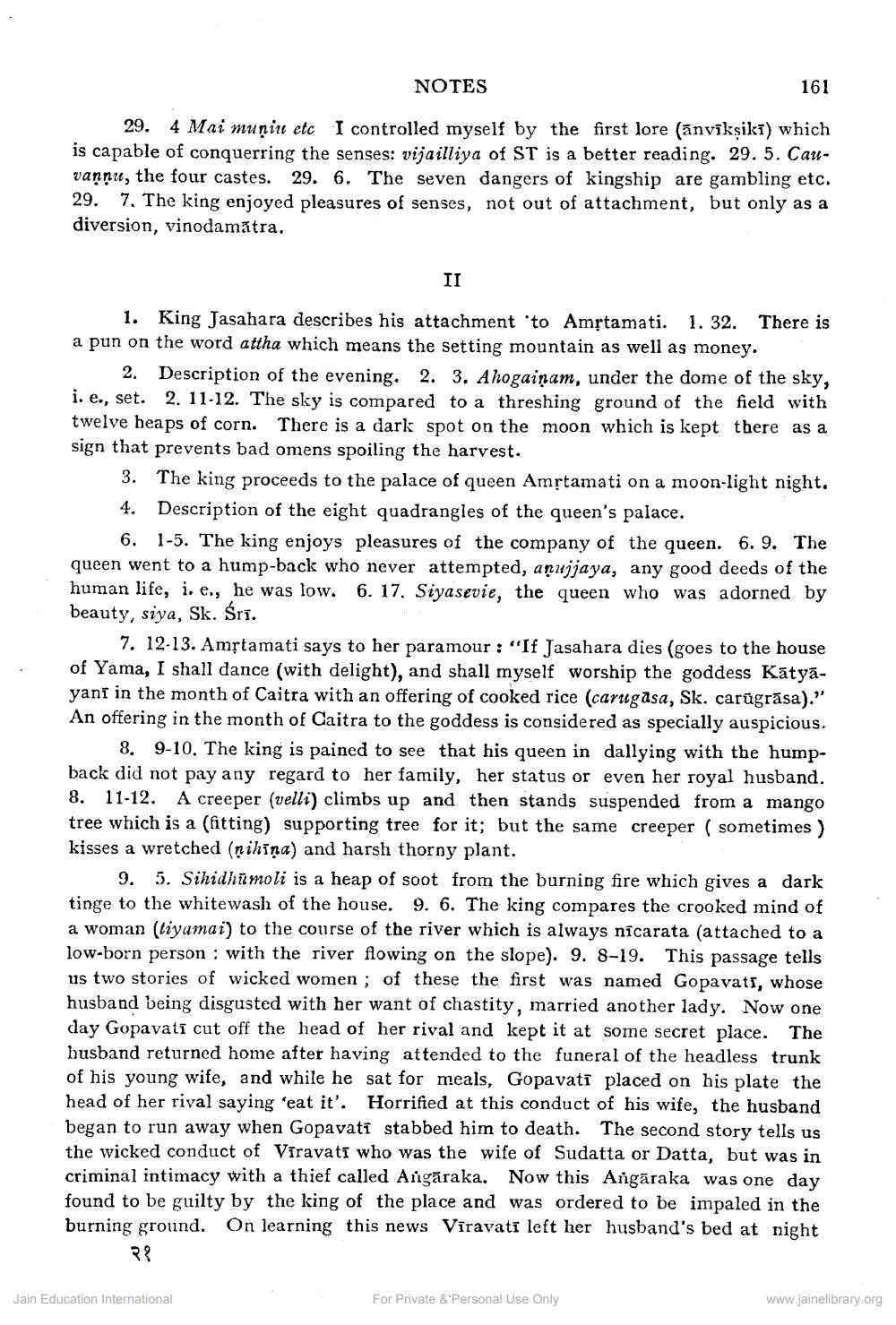________________
NOTES
161
29. 4 Mai munine etc I controlled myself by the first lore (anvīksikt) which is capable of conquerring the senses: vijailliya of ST is a better reading. 29. 5. Cauvannu, the four castes. 29. 6. The seven dangers of kingship are gambling etc. 29. 7. The king enjoyed pleasures of senses, not out of attachment, but only as a diversion, vinodamātra.
II
1. King Jasahara describes his attachment 'to Amrtamati. 1. 32. There is a pun on the word attha which means the setting mountain as well as money.
2. Description of the evening. 2. 3. Ahogaiņam, under the dome of the sky, i. e., set. 2. 11-12. The sky is compared to a threshing ground of the field with twelve heaps of corn. There is a dark spot on the moon which is kept there as a sign that prevents bad omens spoiling the harvest.
3. The king proceeds to the palace of queen Amộtamati on a moon-light night. 4. Description of the eight quadrangles of the queen's palace.
6. 1-5. The king enjoys pleasures of the company of the queen. 6.9. The queen went to a hump-back who never attempted, aņujjaya, any good deeds of the human life, i.e., he was low. 6. 17. Siyasevie, the queen who was adorned by beauty, siya, Sk. Śri.
7. 12-13. Amộtamati says to her paramour : "If Jasahara dies (goes to the house of Yama, I shall dance (with delight), and shall myself worship the goddess Katyayani in the month of Caitra with an offering of cooked rice (carugasa, Sk. carūgrása).” An offering in the month of Caitra to the goddess is considered as specially auspicious.
8. 9-10. The king is pained to see that his queen in dallying with the humpback did not pay any regard to her family, her status or even her royal husband. 8. 11-12. A creeper (velli) climbs up and then stands suspended from a mango tree which is a (fitting) supporting tree for it; but the same creeper (sometimes ) kisses a wretched (nihiņa) and harsh thorny plant.
9. 5. Sihidhūmoli is a heap of soot from the burning fire which gives a dark tinge to the whitewash of the house. 9. 6. The king compares the crooked mind of a woman (tiyamai) to the course of the river which is always nicarata (attached to a low-born person : with the river flowing on the slope). 9. 8-19. This passage tells us two stories of wicked women ; of these the first was named Gopavati, whose husband being disgusted with her want of chastity, married another lady. Now one day Gopavatī cut off the head of her rival and kept it at some secret place. The husband returned home after having attended to the funeral of the headless trunk of his young wife, and while he sat for meals, Gopavati placed on his plate the head of her rival saying 'eat it'. Horrified at this conduct of his wife, the husband began to run away when Gopavati stabbed him to death. The second story tells us the wicked conduct of Vīravats who was the wife of Sudatta or Datta, but was in criminal intimacy with a thief called Angāraka. Now this Angāraka was one day found to be guilty by the king of the place and was ordered to be impaled in the burning ground. On learning this news Vīravatī left her husband's bed at night
२१
Jain Education International
For Private & Personal Use Only
www.jainelibrary.org




